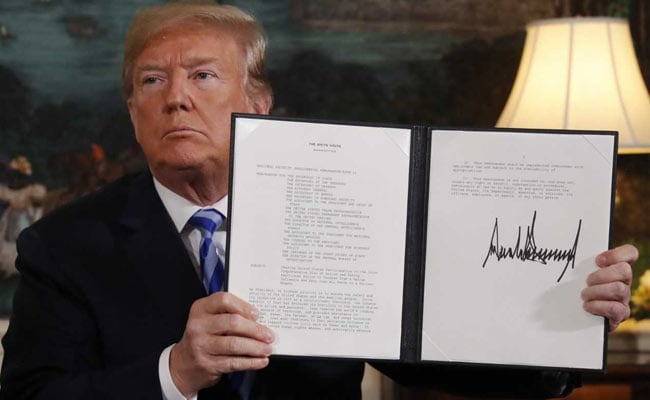
Donald Trump on Tuesday withdrew from the Iran nuclear deal.
- Need to resolve the matter with "dialogue and diplomacy", says India
- Trump's stand complicates India's diplomatic relations with Iran, Russia
- If US imposes sanctions, it could cast uncertainty over global oil prices
Did our AI summary help?
Let us know.
New Delhi:
US president Donald Trump's sudden pull-out from a crucial nuclear deal with Iran has received a cautious response from India, which has much riding on a peaceful resolution of the issue. As the five other nations involved in the deal rushed to salvage the situation, the foreign ministry emphasised on the need to resolve the matter with "dialogue and diplomacy".
"India has always maintained that the Iranian nuclear issue should be resolved peacefully through dialogue and diplomacy by respecting Iran's right to peaceful uses of nuclear energy as also the international community's strong interest in the exclusively peaceful nature of Iran's nuclear programme," External Affairs Ministry spokesperson Raveesh Kumar said.
President Trump, who for long criticised the deal meant to curb Iran's nuclear programme in exchange for lifting of sanctions -- has refused to ratify it. He also threatened to re-impose sanctions on Iran.
His stand complicates India's diplomatic relations with Iran and Russia. If US imposes sanctions, it could cast uncertainty over global oil prices and have an effect on India's oil imports. Iran is the third biggest supplier of oil to India after Iraq and Saudi Arabia. After President Trump's announcement, oil prices rose by 2 per cent on Wednesday.
Before sanctions on Iran were lifted in 2015, India received limited oil supply from Iran, which delivered it without freight charges, taking half the payment in rupees and not raising bills for the rest.
Progress on the Iran's strategic Chabahar port, which India is developing with a $500 million commitment, may also be hit by the sanctions. The port is crucial to India, as it would allow transfer of goods to Afghanistan through a land route, bypassing Pakistan. It is expected to act as a counter to Pakistan's Gwadar port, barely 100 km away, which is being developed by China.
India is also a founder of the International North-South Transport Corridor - a 7,000-km multi-modal network -- from Iran to Russia.
Work on the corridor, which allows India to bypass Pakistan and gain access to Central Asia and beyond, had picked up after sanctions on Iran were lifted in 2015. Fresh sanctions may affect work again.
The nuclear agreement between Iran and six nations -- the US, France, Britain, Germany, Russia, China - was concluded three years ago after a decade of diplomacy. It was considered a signature foreign policy achievement of President Trump's Democratic predecessor Barack Obama.
"India has always maintained that the Iranian nuclear issue should be resolved peacefully through dialogue and diplomacy by respecting Iran's right to peaceful uses of nuclear energy as also the international community's strong interest in the exclusively peaceful nature of Iran's nuclear programme," External Affairs Ministry spokesperson Raveesh Kumar said.
President Trump, who for long criticised the deal meant to curb Iran's nuclear programme in exchange for lifting of sanctions -- has refused to ratify it. He also threatened to re-impose sanctions on Iran.
His stand complicates India's diplomatic relations with Iran and Russia. If US imposes sanctions, it could cast uncertainty over global oil prices and have an effect on India's oil imports. Iran is the third biggest supplier of oil to India after Iraq and Saudi Arabia. After President Trump's announcement, oil prices rose by 2 per cent on Wednesday.
Before sanctions on Iran were lifted in 2015, India received limited oil supply from Iran, which delivered it without freight charges, taking half the payment in rupees and not raising bills for the rest.
Progress on the Iran's strategic Chabahar port, which India is developing with a $500 million commitment, may also be hit by the sanctions. The port is crucial to India, as it would allow transfer of goods to Afghanistan through a land route, bypassing Pakistan. It is expected to act as a counter to Pakistan's Gwadar port, barely 100 km away, which is being developed by China.
India is also a founder of the International North-South Transport Corridor - a 7,000-km multi-modal network -- from Iran to Russia.
Work on the corridor, which allows India to bypass Pakistan and gain access to Central Asia and beyond, had picked up after sanctions on Iran were lifted in 2015. Fresh sanctions may affect work again.
The nuclear agreement between Iran and six nations -- the US, France, Britain, Germany, Russia, China - was concluded three years ago after a decade of diplomacy. It was considered a signature foreign policy achievement of President Trump's Democratic predecessor Barack Obama.
Track Latest News Live on NDTV.com and get news updates from India and around the world

